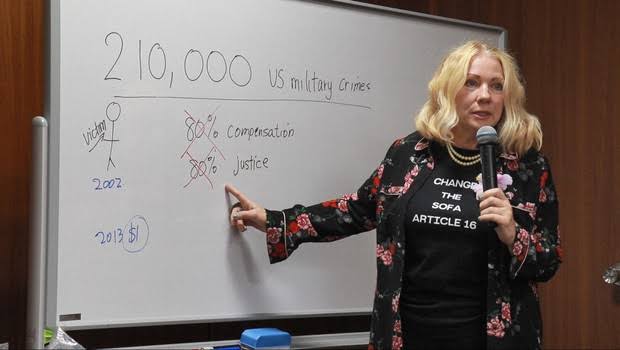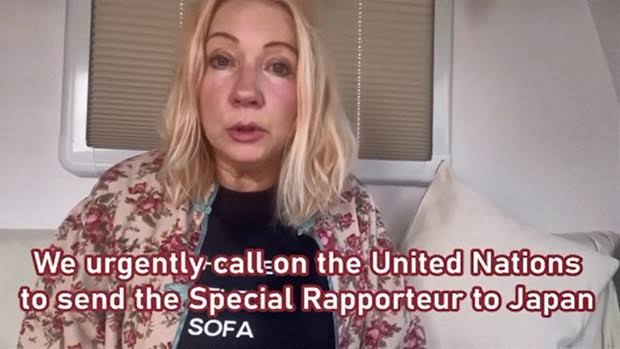Australian woman raped by US serviceman in Japan calls for UN investigation

Catherine Fisher gives an explanation on crimes and accidents caused by U.S. military personnel in Japan, in Tokyo’s Chiyoda Ward on Oct. 10, 2024
An Australian woman who was raped in 2002 by a U.S. serviceman in Japan is speaking out over the lack of protection for the rights of victims of sexual violence, saying the Japan-U.S. Status of Forces Agreement (SOFA), which gives special privileges to the U.S. military, forms a backdrop to crimes by the force’s personnel.
The woman, Catherine Fisher, resides in Tokyo. She participated by video in a U.N. meeting this month, and called for the body to launch an investigation and ensure victims receive the justice that they deserve.
She says she also hopes to meet Japanese Prime Minister Shigeru Ishiba, who has publicly stated his aim to revise the SOFA, and to convey the current situation and her thoughts to him.Introducing victims’ current situation
Fisher delivered her video comments in an informal meeting of the U.N. Committee on the Elimination of Discrimination against Women held in Geneva, Switzerland, on Oct. 14.
Noting that there have been many crimes and accidents caused by U.S. personnel in Japan in the post-World War II period, she said that “many victims are remaining silent due to fear, stigma, and lack of support.
“Article 16 of the SOFA only calls on the United States armed forces, the civilian component, and their dependents to “respect” the law of Japan, and if a member of the U.S. military flees to a U.S. base after committing a crime, then Japanese police in principle cannot arrest them.
This is one of several privileges granted to the U.S. military. On this point, Fisher stated, “The perpetrators are able to flee Japan. … Upon returning to the U.S.A., they are committing crimes there, which is now a cross-border issue.”Seeking justice for victims
According to Fisher and reports, she was raped by a U.S. serviceman she didn’t know in Yokosuka, Kanagawa Prefecture, in April 2002, but the serviceman wasn’t charged and returned home without paying damages. She says he went on to commit a sex crime there.
At the close of her message to the U.N., she said, “We urgently call on the United Nations to send the Special Rapporteur to Japan to address these systematic failures and the lack of compensation for victims, and to ensure that victims receive the justice that they deserve.
“Calling for an investigation from the UN Catherine Fisher speaks in a video message delivered at an informal meeting of the U.N. Committee on the Elimination of Discrimination against Women on Oct. 14, 2024.
She said that despite the large number of crimes and accidents caused by U.S. military personnel in Japan, the rights of victims were not being protected, and called for the U.N. to investigate the issue.
U.N. special rapporteurs are independent experts appointed by the U.N. Human Rights Council to conduct investigations on specific human rights themes and other issues, report on those issues and provide recommendations.
Their reports and recommendations are not the official views of the U.N., but governments can come under pressure to respond to them.

In Japan, David Kaye, U.N. Special Rapporteur on the promotion and protection of the right to freedom of opinion and expression, is known for a report raising questions about the independence of the Japanese media.An issue to convey to PM Ishiba
Fisher said that even if the special rapporteur is not dispatched as she requests, she will continue to call strongly for this to happen.
She said that for 22 years since she was raped, she has been calling for the establishment of a 24-hour counseling center for rape victims and for revisions to the SOFA, but there have been no such moves.
She says this has regrettably forced her to rely on the strength of the United Nations.At the same time, she wants to convey this to Prime Minister Ishiba, who has expressed a desire to revise the SOFA.
She pointed out that the world is becoming aware of the abnormality of the Japanese government, which is seemingly tacitly accepting rape.
She added that she hoped the Japanese government would fulfill its due responsibility as a leader protecting the people living in Japan and act on the prime minister’s own words to revise the bilateral accord.




